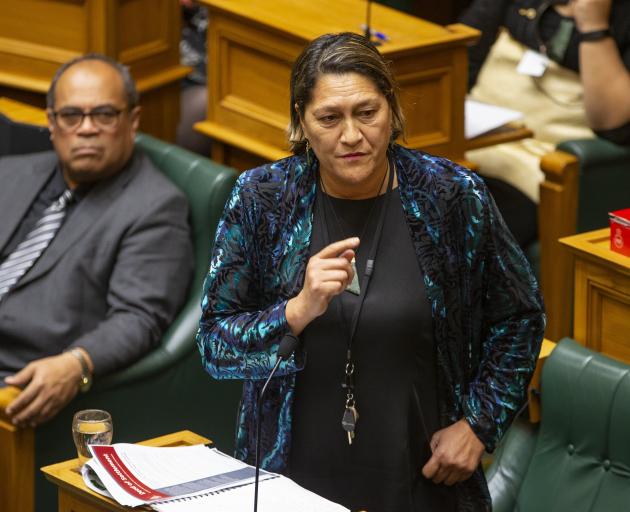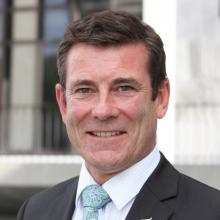

The Dunedin National list MP had to call upon all his nimbleness and then some on Wednesday, as he tried to suggest without saying as much that Mr Rurawhe might perhaps have made a mistake in his handling of the shock news that Minister outside Cabinet Meka Whaitiri was resigning from Labour and joining Te Pāti Māori.
This news had broken as a rumour earlier in the day and by 10am had been confirmed by Ms Whaitiri herself in a speech in Gisborne.
But — and this was a slender yet crucial but which Mr Rurawhe was hanging on to grimly — Ms Whaitiri had not formally written to him to announce her resignation. Rather, she had sent an email to say that her proxy vote was no longer to be case by the Labour Party.
By 2pm when the House sat down to business the whole country, Mr Rurawhe included, knew what had happened ... except, in a precisely legal manner, the Speaker knew no such thing.
"Regardless of the way that the Hon Meka Whaitiri has advised both the public, the Labour Party, or anyone else about anything that she’s doing, she has not notified me," he said.
"I’m not sure that we have yet had the full disclosure of what’s actually transpired here," Mr Woodhouse said.
"I accept the point that you make, that what Meka Whaitiri says outside this House does not count necessarily, but you yourself have acknowledged that correspondence was received, but seemed to indicate that it was not in the form or of the substance that was described by Ms Whaitiri after she sent it to you. I do think we need to traverse this."
Thus, despite extensive and forensic questioning by Mr Woodhouse and others, by 2.30pm no-one was any the wiser whether Ms Whaitiri was an MP or not. The Electoral Act suggested that she was not, but for now Mr Speaker considered her to be an independent MP.
In the meantime, waiting patiently for all this to end, was Labour Taieri MP Ingrid Leary, who was waiting to ask Grant Robertson Question One, about what reports the Finance Minister had received about the New Zealand economy ... to which he responded with great verve, no doubt being very pleased indeed about being able to talk about something else. Anything else.
The vexed question of Ms Whaitiri was not going away though, and the following day Mr Rurawhe tried to head trouble off at the pass by saying what official information the Speaker had so far — which to repeat, was not what he himself and the entire country already knew — meant that he had no leeway but to leave the question of Ms Whaitiri, who was not around to speak for herself, unanswered.
That still left the question of who could write to whom about the status of whomsoever to be dealt with. It is just one of many issues still to be ventilated, and a key one was highlighted by Mr Woodhouse in his reply to the Leader of the House’s business statement: "Could he advise the House whether the Government is contemplating introducing legislation amending or repealing the waka-jumping provisions of the Electoral Act?"
"I thank the member for his question," Mr Robertson, who was probably not at all grateful, replied.
"At this point in time, the Government is not intending to do that. I’m sure it will be a subject of rich conversation in times to come."
So why does all beltway bickering matter?
Well, this is the first true test of amendments made to the Electoral Act during the last Parliament, popularly known as the "waka jumping laws". The government, at New Zealand First’s insistence, tried to promulgate what would happen if a sitting MP decided to change parties, but it is still uncharted water as to how this process will work in a real world situation, and also how it will play out if it comes into conflict with Parliament’s own rules, Standing Orders.

While this is playing out in a Parliament where Labour will retain its majority and can still command the House’s confidence it perhaps is not such an issue, but Labour’s primacy is the exception rather than the norm.
If this year’s election result turns out to be as close as predicted, an MP switching sides some time in the next term could have serious ramifications for the survival of a future government, so you would want to have some idea ahead of time how the law works so as to avoid a constitutional crisis.
But, as Mr Robertson said, that conversation is for a time still to come.
Withdraw and apologise
They say a day is a long time in politics, but sometimes so is half a day. On Tuesday evening, in her second reading speech on the Customs and Excise (Arrival Information) Amendment Bill, Ms Leary offered this tribute to the proposal’s sponsoring minister’s choice to legislate rather than regulate: "I think it’s a testament to the Hon Meka Whaitiri that she has chosen instead to go through the House, because it does raise the spectre of digital information gathering and sharing ... I think absolutely the right approach has been taken."
It is probably fair to say that by the next morning Ms Leary and her Labour colleagues were not quite too enthusiastic about Ms Whaitiri’s decision making process.
Rite of passage
Three weeks ago Dunedin Labour list MP Rachel Brooking was a backbencher asking the patsy questions: now she is the Minister for Oceans and Fisheries and letting Tamati Coffey know what recent announcements she has made regarding transformation in the fishing sector.
More trickily, she also fielded a question from former conservation minister Eugenie Sage regarding Greenpeace Aotearoa and its dismissal of the announcement it was not doing enough to protect from damage to fragile habitats from bottom trawling.
"I look forward to the submissions from Greenpeace on the transformation plan and note that this is a high-level strategy document about modernising the fishing industry and sparking these conversations," Ms Brooking said, skilfully batting away her first curly supplementary.
Ms Brooking’s crash course in ministerial responsibilities continued a few hours later, as she navigated her first annual review debate.
Begin again
National are once more into the breach to try to find a new candidate for Taieri, following the implosion of former candidate Stephen Jack. Special general meetings are being held on May 17 to form a new candidate selection committee.
Southern Say understands there is some chagrin on the plains that Mr Jack was selected ahead of people who had already gone through National’s candidate’s college, a measure put in place to try to find any skeletons and train people for the role. The party will be hoping some of those disappointed folk are prepared to try again.












